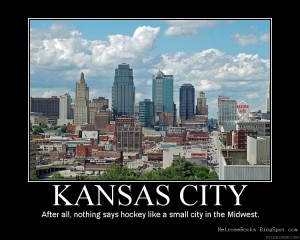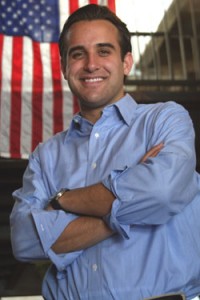By Julie Rath, on Fri Nov 8, 2013 at 8:30 AM ET

If you’re still rocking that North Face parka over your suit jacket, it’s time for an upgrade.
Nothing ruins a great look faster than a not-so-great coat. For some reason outerwear often seems to be at the end of peoples’ priority lists, but I can’t stress enough how important it is for your coat or jacket to be up to par with the rest of your outfit. Think about it: you walk into a restaurant to meet a date.
Before you take your coat off, she’s already formed an impression of you. The same goes for your office elevator. People tell me all the time that they sneak in to their office building in junk clothes/shoes and change once they’re there, but if you’re riding up in the elevator with people in your office, the damage is done.
So, have I convinced you of the merits of a good overcoat yet? Good! Here are my suggestions on how to choose one.
Fit: I see too many people around in oversized, too long overcoats – such a disappointing look! It makes me think of a little kid playing dress-up. Ideally, your overcoat should fit comfortably over a suit but still be slim enough to look stylish with just a shirt and pants. The best, most versatile length for a modern but still classic look is around your knee.
It should hit anywhere from mid/low-knee to just above it, depending on how modern you want the look to be (the shorter you go, the younger the look). A good-fitting overcoat should make you look taller, leaner and broader across the shoulders.
Sizing: An overcoat is meant to fit on top of your suit, so when buying off-the-rack, start by going up one size from your suit. Try it on with a suit jacket or blazer and be sure it can close. The sleeves should cover your suit and shirt sleeves.

Buttons – Make sure it buttons to a location on your body that you’re comfortable with. I like this houndstooth check coat above from Balenciaga, but notice how low it buttons on the model’s body. If it’s too low, and you get cold easily, you might want to choose a coat that buttons a little higher. Remember that you’ll likely be wearing a scarf with it on very cold days which will give you additional coverage. What about the number of buttons? Most people will need 3 buttons for a classic single-breasted style, but if you’re very tall (over 6’ 3”), you should get 4.
Read the rest of…
Julie Rath: How to Buy an Overcoat
By John Y. Brown III, on Thu Nov 7, 2013 at 12:00 PM ET
 Each year about this time my daughter and I take a father-daughter trip.
And this year is no exception.
We started with a bitterly cold weekend at Camp Piamingo for our first father -daughter weekend about 8 years ago. It was called Indian Summer, I think and was designed for dads and daughters. We gave oursleves the nicknames Papa Bear and Baby Bear and brought board games like Hooskerdu andCandyland. We slept on the floor of a cabin in below freezing tempretures as I kept an eye on a large spider that was either lazy, dead or frozen into the woodwork a few feet away.
The next year we went to Chicago to the American Girl Store and to see the Cheetah Girls in concert. Except I mistakenly bought Cheetah Girl tickets to a concert 2 hours from our hotel and didnt have a car. Maggie, my 9 year old and very wise daughter shrugged and suggested we just go to dinner, adding “This is supposed to be about bonding with each other anyway. Not about concerts.”
She just gets more awesome each year. And I look forward to bonding and seeing what she teaches me.
 This weekend we decided to repeat last year’s NY weekend instead of repeating the original Camp Piamingo weekend. This weekend we decided to repeat last year’s NY weekend instead of repeating the original Camp Piamingo weekend.
And this year Momma Bear will be joining us.
By Josh Bowen, on Thu Nov 7, 2013 at 8:30 AM ET “The journey is not measured by math but by feelings, because the feel lasts longer.”
Most will come to me with the idea of losing weight, body fat, gaining muscle or something that can be tracked. What most will realize is these measurables only account for a small percentage of the journey. It is the things we cannot measure by numbers that matter most. Increased self esteem, more energy, believing in one’s self are all feelings you cannot measure but have a dramatic impact on how you will feel about fitness.
To me, as a trainer, the most impactful reflection from fitness is confidence. Transforming one’s body and loving what you see in the mirror is great but having the confidence inside the gym as well as outside the gym, impacting EVERY intricate detail of life, is what fitness is all about.
As a skinny 140 lbs weakling, I learned the value of confidence through fitness. I was shy and my social skills were lacking but as I started my journey in fitness I realized my confidence began to blossom. My social life was dramatically improved. The way I felt about me and my world couldn’t of been better.
Not only did I transform my body but my life. Fitness is that impactful. Quite frankly, I cannot think of another thing that can have as big of a dramatic impactful on someone’s mind, body and spirt as fitness. It literally impacts everything about you.
 The most successful clients I have had have been impactful by increased confidence. As a result, some have had increased function in their occupation, some have increased their relationships with their significant others, some have had increased their confidence to walk away from bad situations and others have had the confidence to walk away from their full time careers and transition into fulfilling their dream of being a personal trainer. The most successful clients I have had have been impactful by increased confidence. As a result, some have had increased function in their occupation, some have increased their relationships with their significant others, some have had increased their confidence to walk away from bad situations and others have had the confidence to walk away from their full time careers and transition into fulfilling their dream of being a personal trainer.
It comes in all shapes and sizes, feelings and impacts but confidence is by far my favorite direct reflection of the fitness journey. It also has the most impact on people’s lives, all the more reason to start your fitness journey.
By John Y. Brown III, on Wed Nov 6, 2013 at 12:00 PM ET I watched the hubbub over the weekend and KY US Senator Rand Paul borrowing some lines from Wikipedia to use in a speech where he references the movie plot of Gattaca Well, for what it’s worth, if I had somehow found myself in a situation where I had to give an important speech and reference the movie Gattaca, I think I would simply have looked it up on Wikipedia for the plot summary–just like Sen Paul— instead of watching the movie for myself and having to come up with my own personal commentary about it.
I remember when the movie Gattaca came out in 1997 and was in the local theaters. At the time I had several opportunities to see it with my wife and chose instead Good Will Hunting, Titanic, As Good as it Gets, and even Lost World instead. And, yes, if you really press me to be completely forthright and transparent about this issue, I saw Nicholas Cage’s Face Off that year instead of Gattaca too. That was probably a mistake in retrospect.
But the point is I had many opportunities to see Gattaca in the theatres and never did. Later when it was on video, I rented (well….there are too many movie titles to list. Just know there were several hundred rental movies I chose to rent since 1997 instead of Gattaca, too) Later when it was available on cable, Gattaca got beat out by several hundred other movies I chose to watch instead.
Yes, I really love movies. But not enough to have ever watched Gattaca. Even though it did get an 82% on Rotten Tomatoes….. I can’t really explain it why it had no appeal to me. Maybe I’m just not much of a sci-fi guy.
Plus, Ethan Hawke, Jude Law, Uma Thurman and Gore Vidal?? I just didn’t see how the chemisy would work.
And, finally, just the word Gattaca made my stomach turn and head ache wondering what it could be about that I wasn’t interested in. Finally, it is apparently mostly an anti-abortion political diatribe and those get a little wearisome to me whether I agree or not.
 And for the final test–the test that proved beyond doubt—I understand and support Sen Rand Paul’s choice for going the Wiki route on this movie instead of watching it for myself? Even after all the brouhaha about the speech and movie over the weekend, I still have no desire to see Gattaca. I haven’t even read the Wikipedia article about it. Or even the few sections Sen Paul used. And for the final test–the test that proved beyond doubt—I understand and support Sen Rand Paul’s choice for going the Wiki route on this movie instead of watching it for myself? Even after all the brouhaha about the speech and movie over the weekend, I still have no desire to see Gattaca. I haven’t even read the Wikipedia article about it. Or even the few sections Sen Paul used.
And, frankly, don’t think I ever will. I’ll take Sen Paul’s word for it about the movie and what it says on Wikipedia about it (and back him up on not laboriously sitting through the whole tedious sci-fi flick).
I think I’ll just watch either Goodwill Hunting or As Good as it Gets again. Maybe both…if I don’t have to use either of them in a speech.
By Lauren Mayer, on Wed Nov 6, 2013 at 8:30 AM ET Every generation seems to experience a couple of epic historic moments that define them – we have ‘The Greatest Generation’ with their memories of World War Two, former ‘flower children’ who remember The Summer of Love (or at least did some indiscriminate making-out that year), and so on. I’m on the younger side of Baby Boomers – I was 10 in 1969, so the only real hippie experience I had was embroidering flowers on my bellbottom jeans and writing earnest but dreadful poetry with lines like “the earth was meant for love, not pollution.”
Usually these landmark moments are pretty serious, even tragic, like assassinations or weather-related disasters. And occasionally, they can be celebrations of the human spirit, like the first moonwalk, the falling of the Berlin Wall, or the record number of babies born 9 months after major power outages. But only rarely do we find a transformational, epic moment that has nothing sad about it, nothing triumphant, but just pure fun – in fact, up until recently, the only examples I could think of were pop culture silliness, like pet rocks, the Macarena, or Gangnam Style.
However, due to a calendar quirk, this month will be the first time since 1888 that Chanukah and Thanksgiving have overlapped. And it won’t happen again for over 77,000 years. (Which is how long I know many people hope it will be until the Macarena comes back.) So naturally, people are jumping on it as an opportunity to celebrate, to develop fun hybrid recipies (sweet potato latkes with melted marshmallows . . . don’t think about it too much), and of course to find the marketing angle. Someone has already trademarked “Thanksgivukkah,” and you can buy Thanksgivukkah-themed cards, t-shirts, and even a ‘menurkey’ (a menorah in the shape of a turkey).
Even though this would seem to be a completely apolitical moment of joy, in today’s bitter partisan climate I must admit I was expecting some pushback from the far right who keep insisting that our founding fathers meant for this to be a Christian nation, so I thought they’d be horrified that a holiday celebrating American history would be combined with a non-Christian observance. But so far the only objection has come from comedian Stephen Colbert (who complained that the war on Christmas is now going after Thanksgiving). So we can celebrate without reservation!
By John Y. Brown III, on Tue Nov 5, 2013 at 12:00 PM ET  Sometimes I think it would be nice to take a vacation— not “to” any place but “from” myself. Sometimes I think it would be nice to take a vacation— not “to” any place but “from” myself.
Not sure how it works or what the lodging arrangements would look like but would kinda be a nice break to get away from myself for a week — or just a long weekend.
I think a little distance from myself could be good now.
I feel I am getting too enmeshed with myself and showing signs of copendency-…-I have this compulsion to have to know what I am doing and a compulsion to “fix” me. I need to learn to let go and not care what I think about myself.
A self-vacation may be just what I need.
Been a long, long time since I have been able to do that. Can’t even remember last time.
Wonder if there are any Groupons for a vacation like this?
By Jason Grill, on Tue Nov 5, 2013 at 10:00 AM ET  Kansas City has always been an entrepreneurial city. Kansas City has always been an entrepreneurial city.
Companies such as Hallmark, Sprint, DST, Cerner, H&R Block, Garmin and Russell Stover Candies all call Kansas City home. However, a true renaissance in entrepreneurship and a renewed sense of a vibrant startup community has skyrocketed of late. A recent paper from the Kauffman Foundation shows that Kansas City has the third highest increase overall among the largest metropolitan areas in high-tech startup density from 1990-2010 in the United States. Kansas City ranked first for the highest increase among the largest metropolitan areas in high-tech startup density from 1990-2010 in the United States when based only on information and communications technology. This might strike some as surprising since Kansas City is not in Silicon Valley or on the East Coast, however it’s less of a surprise to those familiar with the technology ecosystem there. Kansas City’s growing tech density and its burgeoning startup activity demonstrates that the city has viability as a technology destination. Now, national technology players are truly taking note of the city and its success.
This newfound interest can be seen in the heart of Downtown Kansas City, Missouri at Think Big Partners. Think Big Partners is an early-stage business incubator, startup accelerator and mentorship-based collaborative network that takes ideas, opportunities and entrepreneurs and helps to take them to the next level. Why is this so important? Here’s why…Think Big Partners just became the first of its kind in the entire world to partner with Microsoft Ventures. To put this in perspective, think something similar to Google Ventures. In the past Microsoft Ventures has opened up its own accelerators in locations such as Tel Aviv, Bangalore, Paris and Beijing. However, Think Big Partners in Kansas City is the first established accelerator to build a partnership with Microsoft Ventures.
“Think Big Partners represents the best of KC as well as startup reach nationally and globally. We’re pleased to be working with them to find and support great startups,” said Cliff Reeves of Microsoft Ventures. The focus of Think Big Partners will continue to be helping entrepreneurs, grow, build and start their companies, but with this impressive partnership with Microsoft Ventures they now will have access to more of the “right” mentors to continue building their brand in an effort to grow and attract companies outside of Kansas City and the Midwest. These types of partnerships also allow Kansas City to attract more capital into town and more access to what it brings. “The extensive resources and boots on the ground that Microsoft Ventures adds to our checklist-oriented process will help us get entrepreneurs from idea to first customer faster and even more efficiently,” said Blake Miller, Director of Think Big Partners Accelerator.
 In addition to what Think Big Partners is doing with Microsoft Ventures, Sprint has also been a relevant player on the tech scene launching the Sprint Mobile Health Accelerator in partnership with the well-known accelerator brand, Techstars. Leaders of early-stage mobile technology companies from across the United States will be coming to Kansas City to work on initiatives driving innovation in health care. Seems like the right focus with all the transformations going on in health care right now doesn’t it? “Wireless innovations are helping people around the world by improving health care, empowering people with disabilities and promoting wellness,” said Dan Hesse, CEO of Sprint. In addition to what Think Big Partners is doing with Microsoft Ventures, Sprint has also been a relevant player on the tech scene launching the Sprint Mobile Health Accelerator in partnership with the well-known accelerator brand, Techstars. Leaders of early-stage mobile technology companies from across the United States will be coming to Kansas City to work on initiatives driving innovation in health care. Seems like the right focus with all the transformations going on in health care right now doesn’t it? “Wireless innovations are helping people around the world by improving health care, empowering people with disabilities and promoting wellness,” said Dan Hesse, CEO of Sprint.
The Sprint Mobile Health Accelerator, powered by Techstars, will provide entrepreneurs in this field an unparalleled opportunity to strengthen their businesses with the guidance of leading technology experts from Sprint, top technology companies in the area and many from around the country. “To me, Kansas City is an obvious place that has an up-and-coming tech community to rival other top geographies,” said David Cohen, Founder and CEO of Techstars. “The presence of leaders in the mobile health care space makes this the perfect home for the accelerator.” Oh, I almost forgot…guess what? The new Sprint Accelerator is located about a block and a half away from Think Big Partners in one of Kansas City’s most desirable neighborhoods, the Crossroads. Kansas City is building true technology density and a real innovation zone in its urban core.
The major Think Big Partners and Sprint Accelerator news comes off the momentum of Kansas City becoming the first city in the United States to receive and implement 100 times faster than broadband Google Fiber services in many areas in the metropolitan area. Downtown Kansas City is getting wired for Google Fiber right now. This will only help Kansas City increase its high-tech density startup growth and help it build on its status as an emerging entrepreneurial technology center.
Kansas City will continue to be a catalyst for growth in the entrepreneurial sector in America and its technology innovation prowess is proving to be on the rise.
Going to Kansas City…Kansas City here I come.
By Erica and Matt Chua, on Tue Nov 5, 2013 at 8:30 AM ET ur Couchsurfing host asked us, “why do people visit Santiago?” Almost interrupting himself he clarified that he believed his city is a great place to live, but that there isn’t much for tourists. Having been there over a dozen times myself I wondered if anyone actually makes Santiago a destination. Then I remembered that one of my friends actually visited Santiago and at the time I wondered: why? Is Santiago worth a couple of days?

Do people visit for the views? Probably not. Even though one of the world’s great mountains is unbelievably close, you probably won’t see it because the city’s smog often obscures the view. OK…then is it the city itself?

The city of Santiago is clean and functional, much like Omaha or Minneapolis. There is as little to dislike as there is to thrill. Considering that the city was founded almost 500 years ago, it lacks the antiquated charm of other colonial towns in South America. It has neither the distinctive European charm of Buenos Aires nor the grittiness of La Paz. Even worse, it’s bested on both sides by it’s easily accessible neighbors of Valparaiso, Chile and Mendoza, Argentina. Head west 90 minutes and you are in the literal San Fransisco of South America, Valparaiso, which rises from the Pacific in a kaleidoscopic collage of precariously placed buildings. Head a few hours to the east and you’re in the Napa Valley of South America, Mendoza, which treats it’s visitors to over sized glasses of wine paired with overflowing Argentine barbeque. Pity poor Santiago, the city serves better as a gateway to other places than a destination in it’s own right.
Read the rest of…
Erica & Matt Chua: Skippable Santiago, Chile
By John Y. Brown III, on Mon Nov 4, 2013 at 12:00 PM ET  Favorite family Halloween story ever. Favorite family Halloween story ever.
When my son Johnny was 3 he dressed up like Batman. He was dressed in full character and kept the mask on at all times–and although only 3 he was a very friendly and talkative child already.
We stopped by Blockbuster before Trick-or-Treating and there were two teenagers, too cool for Halloween (or life), who glanced at us and gave us a scoffing, dismissive look—as if to say “A father and son on Halloween. How lame.”
They had piercings all over, tattoos and Goth attire. Even though I was in my mid 30s, rebellious teens intimidated me so I nudged Johnny away from them.
When I wasn’t looking, Johnny slipped away from me and when I heard him he was making conversation with the two uber-cool teens.
“Hey you guys!” He said cheerfully. “I’m Batman.” No response…just a look of disgust from the teens.
 Then Johnny added, “So who are you guys dressed up as?” Then Johnny added, “So who are you guys dressed up as?”
It was a total smack down by a 3 year old to two teens. They were speechless and humiliated with how silly they looked. They tucked tail and slinked out of the door.
I’ve always felt safe when I was with Johnny since then.
By Jeff Smith, on Mon Nov 4, 2013 at 10:00 AM ET  Q: I just started working full-time on my first political campaign, and I have noticed that many of our decisions are guided by polling and not by a firm belief one way or the other. It has been disheartening to see how someone I believed would be a strong leader is so easily swayed by the polls and is apparently only concerned with getting elected. Am I working for the wrong candidate, or is this what I signed up for? Q: I just started working full-time on my first political campaign, and I have noticed that many of our decisions are guided by polling and not by a firm belief one way or the other. It has been disheartening to see how someone I believed would be a strong leader is so easily swayed by the polls and is apparently only concerned with getting elected. Am I working for the wrong candidate, or is this what I signed up for?
—L.D., St. Louis
The way I interpret your question, I don’t think that’s what you signed up for. But let me explain.
Nearly every candidate worth her salt—at the state legislative level and higher in most states, at this point— uses polls. But good leaders don’t use polls to figure out their positions on issues. They use polls to figure out which of their issue positions they should highlight and which they should downplay. They use polls to figure out how to talk about the issue positions they want to highlight. And they use polls to figure out which attacks merit a response. That’s being poll-savvy, which is smart—not poll-driven, which can be pathetic.
So think about whether your candidate is poll-savvy or poll-driven. And even if he is the latter, ask yourself: Is it awful for a candidate to poll voters before taking a position on an issue or issues? Is that not in some respects what representative democracy is about? Taken to an extreme, obviously, it’s troubling—no one wants to vote for a weather vane. But if a candidate doesn’t have an established position or strong feelings on an issue, I don’t see a problem with taking the pulse of the electorate before deciding.
So is this what you signed up for? No. But I think that may be more about you than it is about him.
Q: Are you following the race for New York City Council Speaker? Seems like any one of a number of people could win. When it gets down to brass tacks, how do legislators make up their minds on leadership votes? Do they vote based on the candidates’ ideology, race, gender, geographic roots or intangible leadership qualities?
—A.M., New York CityNone of the above. In my experience, legislators’ votes in leadership races are almost always about one thing: themselves. Now, I know this sounds counterintuitive, but hear me out.
Suppose you are the Economic Development Committee vice chair and you want to chair the committee. The current chair, whom you despise and often quietly disagree with, is running for Speaker against another member whom you like and generally agree with, and you expect the vote will be close. You will probably vote for the person you despise, because—unless power in that particular legislative body is completely centralized— the chance to chair Eco Devo is probably more alluring to you than the chance to have someone as Speaker whom you like. If power in the chamber is absolutely centralized, and if you totally trust the candidate you like to depose the current chair if she wins (a rare move in most chambers), and if you trust her to appoint you as the new chair, and if you then trust her to give you some power as chair, then you may want to vote for the person you like. As you can see, there are a lot of ifs there.
To take a somewhat simpler example, if you are a freshman Council member who first and foremost aspires to be Speaker, and one of your closest allies, also a first-term member, is running for Speaker against a second-term member whom you dislike, you’ll probably vote against your ally, because if she is elected Speaker and consolidates power, you will likely be termed out before there is another open seat race for Speaker, since you wouldn’t challenge an ally who is the sitting Speaker.
These two examples serve to make a broader point: Leadership votes are usually as much if not more about the ambitions of rank-and-file members than they are about the qualities of the aspirants.
Read the rest of…
Jeff Smith: Do As I Say, A Political Advice Column
|
The Recovering Politician Bookstore
|



















